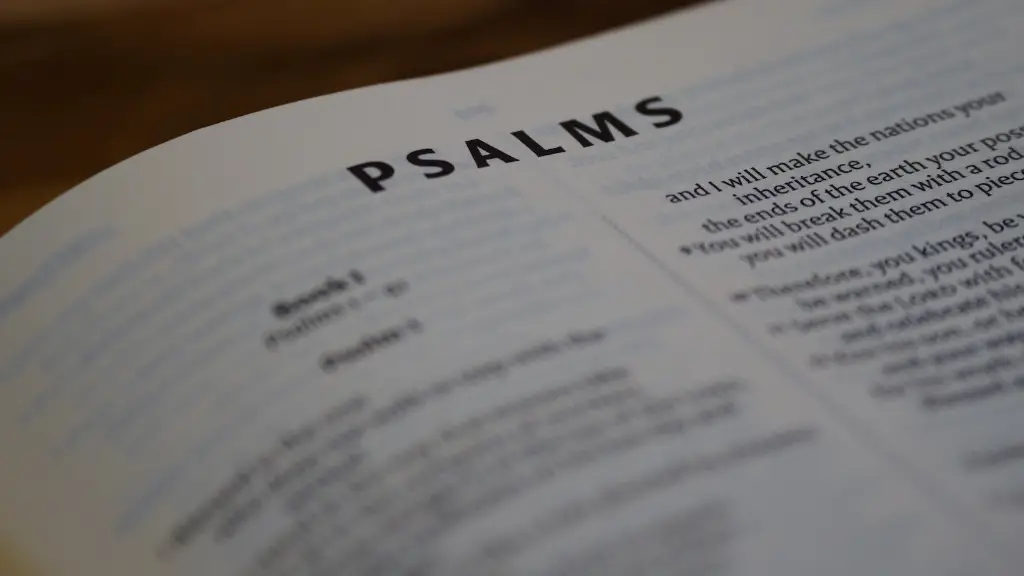The age of the earth has been a source of continual debate throughout history. Christians, particularly, have asserted that the Earth is around 6,000 years old, based on their interpretation of the Bible. But is that really the case? Let’s explore the evidence to see what we can find out.
According to biblical scholars and theologians, the Bible offers various clues that point to the Earth being around 6,000 years old. This age is determined by looking at the genealogies given in the Bible and tracing back to the earliest individuals mentioned in each lineage. This tracing leads to the sixth day of creation when God made the first man, Adam. From there, the scholars extend the timeline out to 6,000 years.
This age estimate is disputed, however, by those who point to scientific evidence showing the Earth to be much older than 6,000 years. Scientists assert that the age of the Earth is closer to 4.5 billion years based on carbon-dating, archaeological evidence, and a range of other methods. This age estimate is taken from numerous scientific studies and is widely accepted by the scientific community.
So, how do we resolve this discrepancy? Could the Bible really be referring to an Earth that’s so much older than 6,000 years? To answer this question, we have to look at some of the nuances of biblical interpretation and hermeneutics. The Bible was not intended to be a scientific textbook, and many passages must be taken metaphorically or spiritually in order to gain an accurate understanding of the overall message. Therefore, it’s essential to interpret biblical texts with an open mind and to consider the scientific evidence. It could be, then, that the Earth is indeed much older than 6,000 years – as science has suggested – but that the Bible is, in fact, referring to this greater expanse of time using metaphorical language.
Moreover, there may be a spiritual significance to this debate. Simply put, the question of the Earth’s age is not the most important factor when it comes to understanding the Bible. Rather, Christians should primarily be concerned with expressing their faith in Jesus Christ and living in accordance with His teachings. In the end, it’s more important to focus on these matters than to spend energy debating the age of the Earth.
Time and Cosmology
Time has been, and still is, one of the most fundamental aspects of cosmology. In the Bible, the concept of time is closely related to the idea of creation, with the notion that God created the world in a six-day period—a concept that has been deeply embedded in Christian theology for centuries. According to the Bible, the period of creation can be linked to the biblical genealogies and calculated to approximate the age of the earth.
In Genesis, God created the world in a matter of six days. This ‘day’ is sometimes believed to be a 24-hour period, however, from the context of other passages, this seems unlikely. Instead, it is likely that the ‘day’ refers to a longer period of time, perhaps even millions of years. This interpretation is supported by the fact that the six-day creation narrative is followed by the seventh, where God rests—a process that could not be completed within a 24-hour period.
This concept of time is also highlighted in Psalm 90:4 “For a thousand years in your sight are but as yesterday when it passes, or as a watch in the night.” This contrast between thousands of years and only one day implies a much larger scale than a 24-hour period. The idea that thousand year days are considered only a watch in the night implies that the Bible sees time much differently than humans do. This suggests that the creation narrative should not be taken literally in terms of a 24-hour day, but should instead be seen as more of a spiritual metaphor.
Science versus Religion
The debate between science and religion tends escalate when the age of the Earth is discussed – particularly since science overwhelmingly proposes an age of the Earth at roughly 4.5 billion years old instead of the 6,000 years argued for by some interpretations of the Bible.
In many ways, this debate is similar to that of creationism versus evolution. While some see a long-standing conflict between science and religion, others see the two ideas as complementary. As Stephen Jay Gould argued, “Non-overlapping magisteria” should be respected and both science and religion can work together to gain an understanding of the world. The idea of evolution supports the belief that God created the world, while scientific evidence points to the Earth being much older than 6,000 years.
When looking at the science versus religion debate as it relates to the age of the Earth, it is certainly possible for both beliefs to co-exist. It is possible for Christians to view the creation narrative in a symbolic, rather than literal, way. The Bible tells of a God who created the world, and science can be used to learn how the world was created and how old the Earth is.
Historical Context
The debate over the age of the Earth is not a new one—it has been happening for centuries. Ancient Greeks such as Thales of Miletus and Anaximander suggested that the Earth was much older than previously believed in the fourth century B.C.. This idea was challenged by Augustine in the fourth century A.D., who argued against theories of an Earth older than approximately 6,000 years old because of biblical interpretations regarding the age of the world.
Throughout the centuries, new evidence came to light that challenged existing beliefs and theories. In the sixteenth century, Nicolas Copernicus proposed the heliocentric model of the solar system, suggesting that the Sun, rather than the Earth, is the center of the universe. This evidence conflicted with existing religious teachings, leading to a great deal of resistance from both the scientific and religious communities.
Today, both science and religion’s understanding of the age of the Earth have advanced significantly, however, there are still disagreements about the age of the Earth’s and a debate between the two sides continues. Although the debate between science and religion over the age of the Earth has been ongoing for centuries, progress has been made within both fields to better understand the history, structure and timeline of the planet.
Current Debate
Today, the debate over the age of the Earth rages on. The scientific evidence seems to overwhelmingly suggest an age of 4.5 billion years, while some interpretations of the Bible propose an age of 6,000 years or less. The two sides also offer very different interpretations of the creation narrative and other biblical passages related to the age of the Earth.
Furthermore, the debate has extended beyond the age of the Earth to include questions about the formation and progress of our universe as a whole. For many, the debate is as much about understanding our place in the world as it is about understanding how old the Earth is. In short, the issue of the Earth’s age is not simply a scientific or religious debate, but is instead a much deeper philosophical and spiritual conversation.
Therefore, even with the best of intentions and considerable effort this debate is unlikely to be resolved in the near future. As the world’s understanding of the universe continues to evolve and new evidence emerges, the debate will evolve as well. It is up to us, then, to engage with the debate in a respectful and open-minded way and to strive to look at both sides of the issue before forming a conclusion.
Theology and Philosophy
The debate over the age of the Earth has implications far beyond the scientific or religious sides of the argument. Theologians and philosophers alike have engaged in the debate, each offering their own unique perspective on the topic. For example, some theologians argue for a literal interpretation of Genesis, suggesting a literal six-day creation narrative and a much younger age of the Earth. Conversely, other theologians suggest a metaphorically interpretation of the creation story, leading them to propose an Earth that is much older than 6,000 years.
Philosophers, too, have entered the discourse, arguing in favor of both scientific and non-scientific interpretations. For example, some suggest that accepting the scientific evidence of an older Earth is in no way contradictory to belief in the Bible. Others, however, have drawn on philosophical thought to make the theological argument that the Bible necessarily implies an Earth of 6,000 years or less.
Ultimately, it is up to each individual to decide how they wish to interpret the evidence and to come to their own conclusions. It is in this spirit of exploration and open-mindedness that the debate can be best served, allowing us to learn more about the world around us and about the nature of faith and knowledge.
Conclusion
In conclusion, the age of the Earth is a complex topic that raises a number of questions and challenges beliefs from both scientific and theological perspectives. The scientific evidence overwhelmingly supports an age of the Earth at roughly 4.5 billion years, while some interpretations of the Bible suggest an age of 6,000 years or less. It is safe to say that neither side is likely to have the last word on the matter, and it is up to each individual to confront the evidence and come to their own conclusions.





